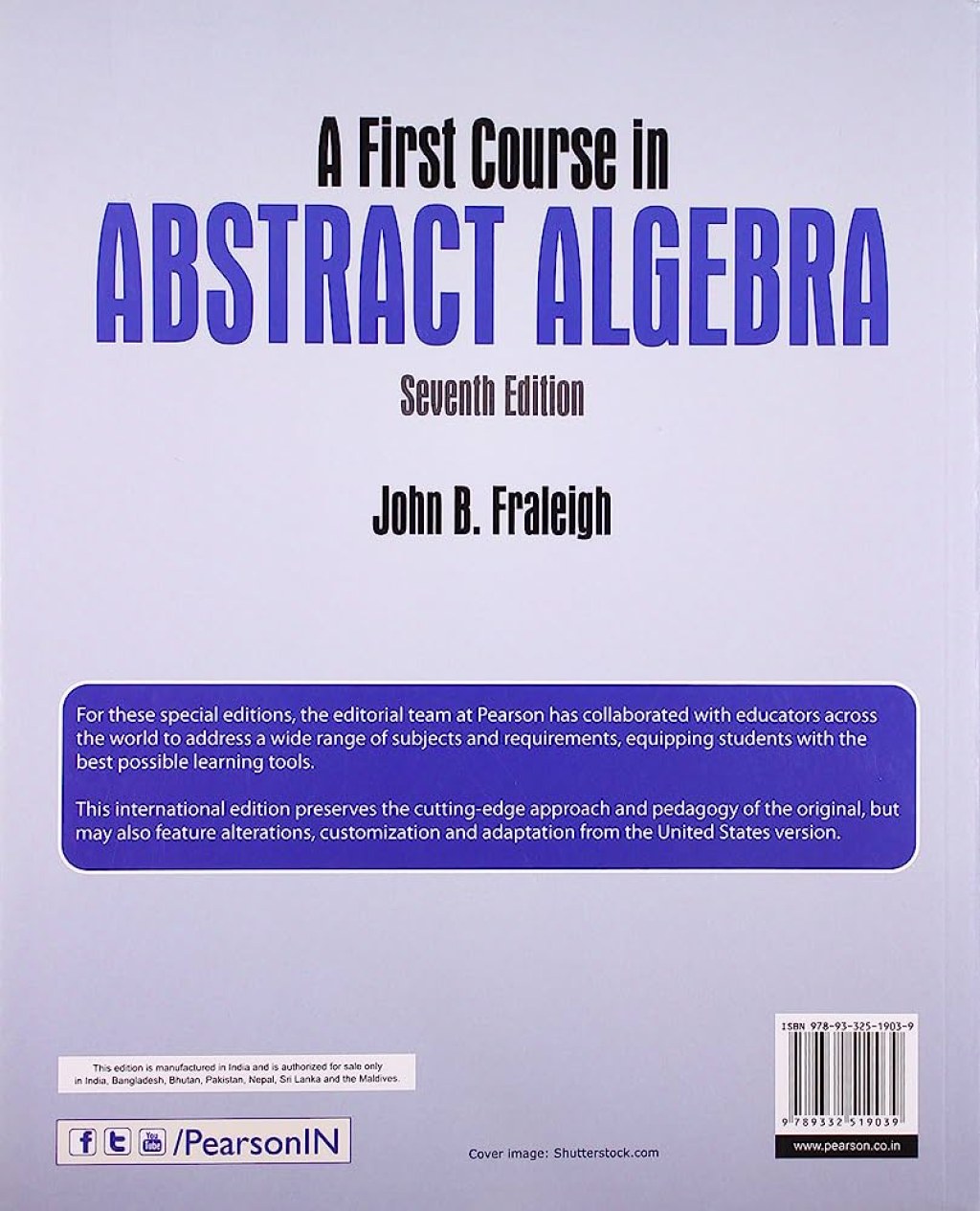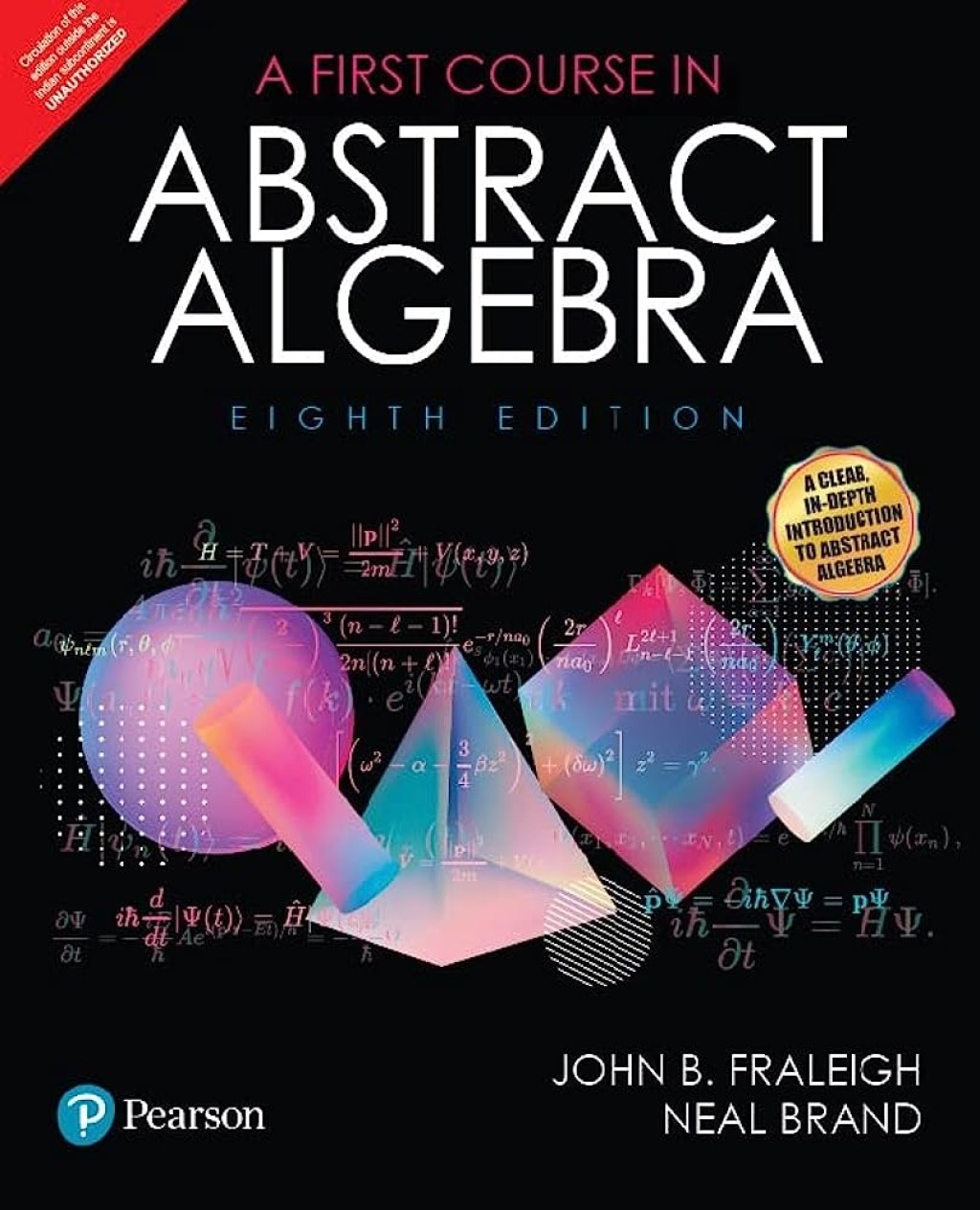Unlock The Power Of Abstract Algebra: Your First Course To Mastering The Foundations
Abstract Algebra: A First Course
Introduction
Welcome, Smart Readers! In this article, we will explore the fascinating world of abstract algebra, specifically focusing on a first course in this subject. Abstract algebra is a branch of mathematics that deals with algebraic structures such as groups, rings, and fields. It is a fundamental field of study for mathematicians and has numerous practical applications in computer science, cryptography, and physics.
3 Picture Gallery: Unlock The Power Of Abstract Algebra: Your First Course To Mastering The Foundations



Abstract algebra provides a deeper understanding of the structures and patterns that exist within mathematical systems. It allows us to explore the underlying concepts of algebraic operations and their properties, going beyond the traditional arithmetic operations we are familiar with. By studying abstract algebra, we gain insights into the nature of mathematical objects and their relationships, leading to significant advancements in various fields.
In this article, we will delve into the key aspects of a first course in abstract algebra, covering topics such as the definition of algebraic structures, operations, and their properties. We will also explore the historical development of abstract algebra and its significance in modern mathematics. So, let’s begin our journey into the world of abstract algebra!
Overview of Abstract Algebra: A First Course

Image Source: stellabooks.com
Abstract algebra: a first course aims to introduce students to the fundamental concepts and principles of algebraic structures. It provides a solid foundation in abstract algebra by exploring topics such as groups, rings, and fields.
1. What is Abstract Algebra?
Abstract algebra is a branch of mathematics that studies algebraic structures and their properties. It focuses on mathematical objects and their relationships, rather than specific numbers or calculations. By abstracting the underlying concepts, abstract algebra enables a deeper understanding of algebraic systems.
2. Who Should Study Abstract Algebra?

Image Source: media-amazon.com
Abstract algebra is primarily studied by mathematicians, computer scientists, and physicists. It is an essential field of study for anyone interested in advanced mathematics or pursuing a career in research or academia. Additionally, abstract algebra has practical applications in cryptography, coding theory, and computer science.
3. When Was Abstract Algebra Developed?
The development of abstract algebra can be traced back to the 19th century, with the works of mathematicians such as Évariste Galois, Augustin-Louis Cauchy, and Richard Dedekind. These mathematicians laid the foundation for abstract algebra by introducing key concepts such as groups, rings, and fields.
4. Where is Abstract Algebra Applied?

Image Source: media-amazon.com
Abstract algebra finds applications in various fields such as computer science, cryptography, physics, and coding theory. It is used to solve complex mathematical problems, design secure encryption algorithms, and analyze algebraic structures in physics and engineering.
5. Why Study Abstract Algebra?
Studying abstract algebra provides a deeper understanding of the fundamental concepts and principles of mathematics. It enhances problem-solving skills, logical reasoning, and critical thinking abilities. Moreover, abstract algebra enables the exploration of complex mathematical structures and their applications in various fields.
6. How is Abstract Algebra Taught?
A first course in abstract algebra typically begins with an introduction to mathematical structures, followed by an in-depth study of groups, rings, and fields. Students learn about algebraic operations, properties, and theorems. The course often includes examples, exercises, and proofs to reinforce understanding and develop problem-solving skills.
Pros and Cons of Abstract Algebra: A First Course
1. Pros:
1.1 In-depth understanding of algebraic structures and their properties.
1.2 Development of critical thinking and problem-solving skills.
1.3 Practical applications in various fields such as cryptography and computer science.
1.4 Enhances logical reasoning and abstract thinking abilities.
1.5 Provides a solid foundation for advanced mathematics and research.
1.6 Promotes creativity and innovation in mathematical exploration.
2. Cons:
2.1 Abstract nature may be challenging for beginners.
2.2 Requires a strong foundation in mathematical concepts.
2.3 Advanced topics can be complex and require extensive study.
2.4 May not be directly applicable to everyday calculations.
2.5 Requires time and effort to grasp abstract concepts and theorems.
Frequently Asked Questions (FAQ)
1. What is the prerequisite knowledge for studying abstract algebra?
To study abstract algebra, a solid foundation in mathematical concepts such as set theory, number theory, and linear algebra is essential. Familiarity with proof techniques and mathematical reasoning is also beneficial.
2. How can abstract algebra be applied in computer science?
Abstract algebra has various applications in computer science, including cryptography, coding theory, and algorithm design. It is used to create secure encryption algorithms, design error-correcting codes, and analyze the efficiency of algorithms.
3. Are there any real-world applications of abstract algebra?
Yes, abstract algebra has real-world applications in fields such as cryptography, computer science, physics, and engineering. It is used in secure communication systems, data encryption algorithms, and the analysis of physical systems.
4. Can abstract algebra help in improving problem-solving skills?
Yes, studying abstract algebra enhances problem-solving skills by promoting logical reasoning, abstract thinking, and the ability to analyze complex structures. It develops the skills needed to solve abstract mathematical problems efficiently.
5. Is abstract algebra only for mathematicians?
No, abstract algebra is not limited to mathematicians. It is a fundamental field of study for anyone interested in advanced mathematics or pursuing a career in research, academia, computer science, or physics.
Conclusion
In conclusion, a first course in abstract algebra provides a solid foundation in algebraic structures, operations, and their properties. It is a fascinating field of study that deepens our understanding of the underlying concepts of mathematics and their applications. By studying abstract algebra, we develop critical thinking skills, problem-solving abilities, and gain insights into the complexities of mathematical structures. So, don’t hesitate to embark on this mathematical journey and explore the wonders of abstract algebra!
Remember, abstract algebra opens up a world of possibilities and applications in various fields. Whether you are a mathematician, computer scientist, or simply a curious learner, abstract algebra offers you the chance to unravel the beauty of mathematics and its practical implications. So, dive into the realm of abstract algebra and discover the power of abstract thinking!
Final Remarks
Abstract algebra: a first course is an essential stepping stone for anyone seeking to explore the depths of algebraic structures and their properties. It provides a solid foundation in abstract mathematics, enabling further exploration in advanced topics and practical applications. However, abstract algebra can be challenging at times, requiring dedication, perseverance, and a passion for mathematical exploration. So, embrace the challenges, engage in rigorous study, and unlock the vast potential of abstract algebra in your mathematical journey. Happy learning!
This post topic: Abstract



